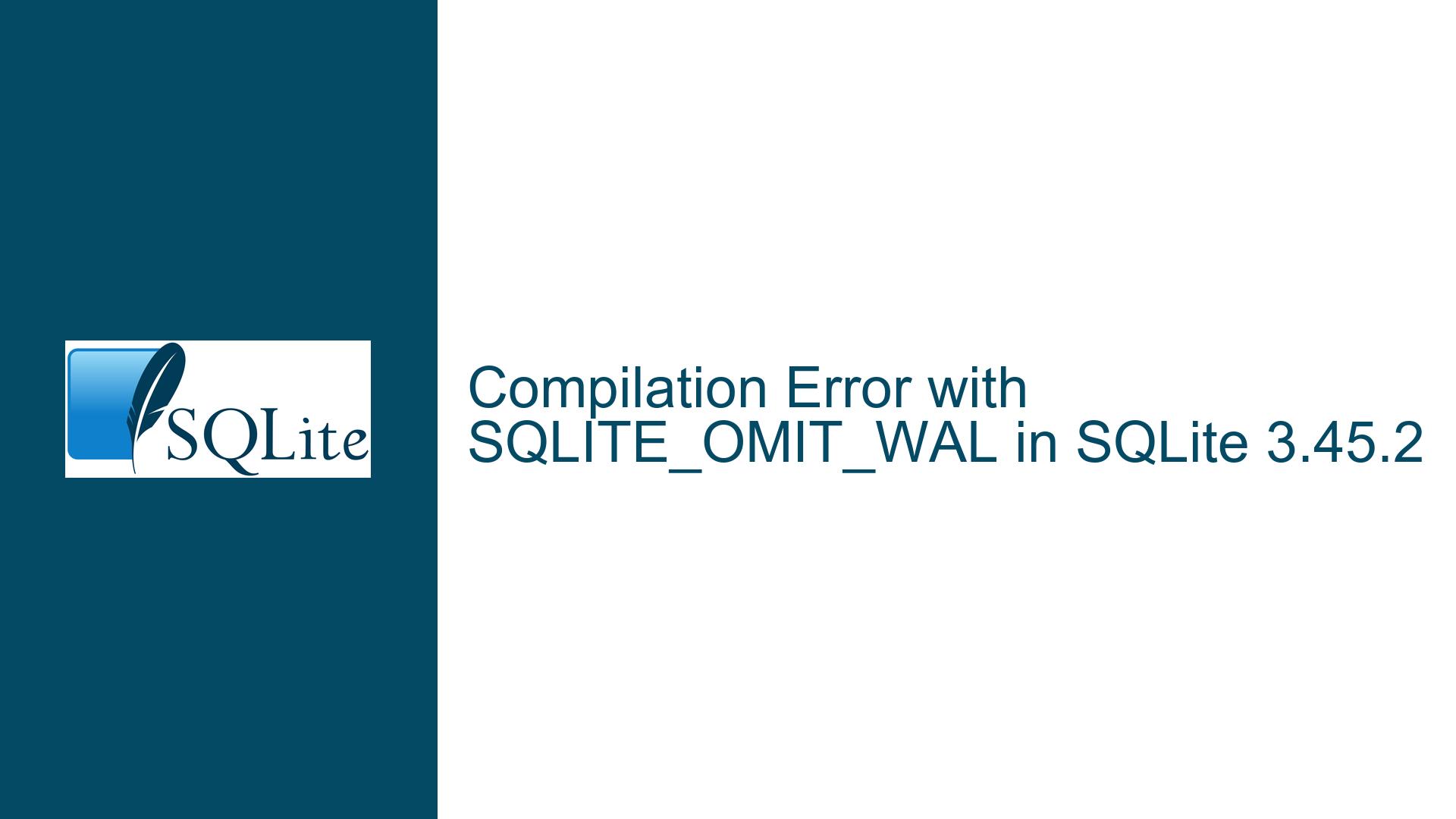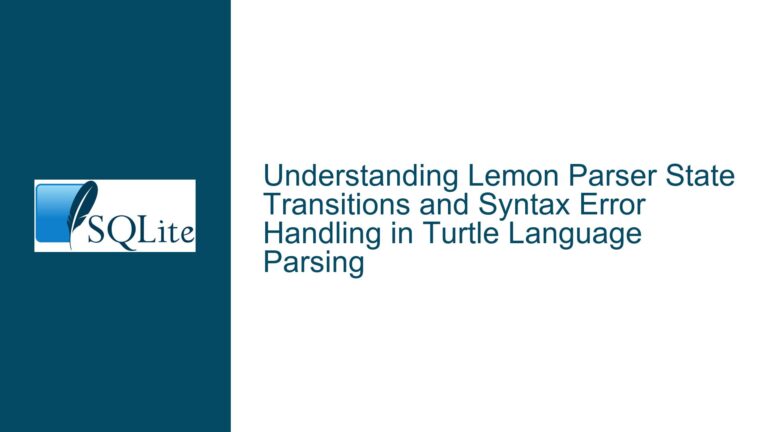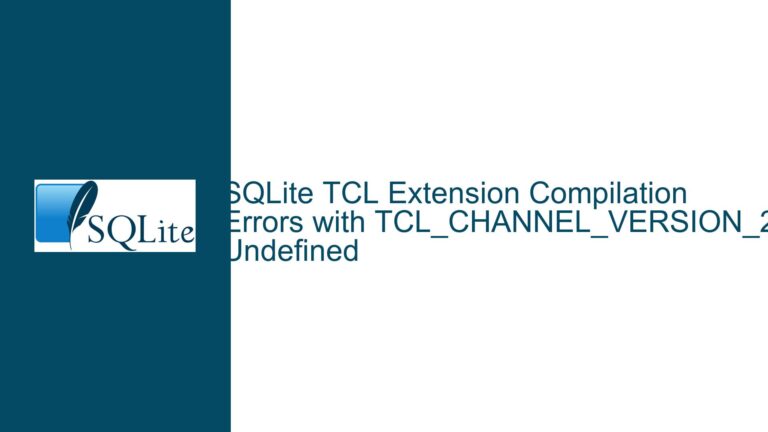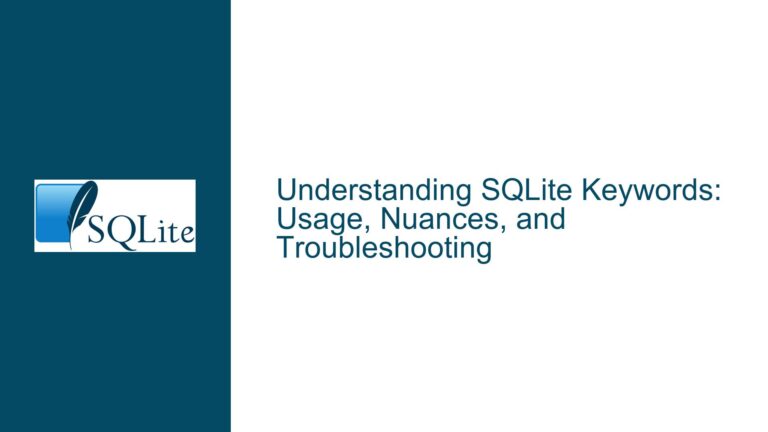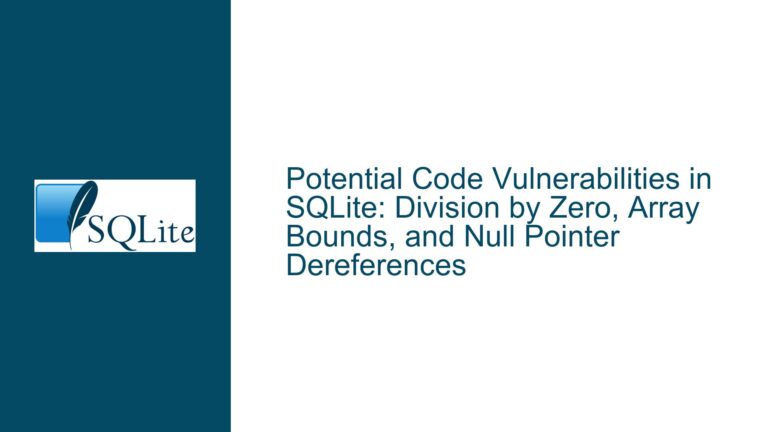Compilation Error with SQLITE_OMIT_WAL in SQLite 3.45.2
Issue Overview: Compilation Failure Due to Incorrect Preprocessor Directive Usage
The core issue revolves around a compilation error that occurs when attempting to build SQLite from source with the SQLITE_OMIT_WAL option enabled. The error manifests specifically in the sqlite3PagerJrnlFile function, where the preprocessor directive #if SQLITE_OMIT_WAL is used incorrectly. This results in a compilation failure with two distinct error messages:
error: #if with no expression– This error indicates that the preprocessor directive#ifis being used without a valid expression. In C/C++,#ifrequires a conditional expression that evaluates to a boolean value (true or false). The absence of such an expression triggers this error.error: ‘Pager’ has no member named ‘pWal’– This error occurs because the code attempts to access a memberpWalof thePagerstructure, which is not defined whenSQLITE_OMIT_WALis enabled. ThepWalmember is part of the Write-Ahead Logging (WAL) mechanism, which is omitted whenSQLITE_OMIT_WALis defined.
The root cause of these errors lies in the misuse of the #if directive. The #if directive is used to conditionally include or exclude code based on the evaluation of a constant expression. However, in this case, the directive is used without a proper expression, leading to the first error. Additionally, the code within the #if block assumes the presence of the pWal member, which is not available when SQLITE_OMIT_WAL is defined, leading to the second error.
Possible Causes: Misconfiguration of SQLITE_OMIT_WAL and Preprocessor Directive Usage
The compilation error can be attributed to several potential causes, all of which revolve around the configuration and usage of the SQLITE_OMIT_WAL macro and the preprocessor directives in the SQLite source code.
Incorrect Definition of SQLITE_OMIT_WAL: The
SQLITE_OMIT_WALmacro is intended to be defined without a value, as per the SQLite documentation. However, the error occurs when the macro is defined in a way that does not provide a valid expression for the#ifdirective. Specifically, definingSQLITE_OMIT_WALwithout a value (e.g.,#define SQLITE_OMIT_WAL) or with an explicit value of0(e.g.,-DSQLITE_OMIT_WAL=0) leads to the compilation error. This is because the#ifdirective requires a valid expression, and defining the macro without a value or with a value of0does not provide one.Improper Use of Preprocessor Directives: The
#ifdirective is used incorrectly in the SQLite source code. Instead of using#if SQLITE_OMIT_WAL, the code should use#ifdef SQLITE_OMIT_WALor#if defined(SQLITE_OMIT_WAL). The#ifdefdirective checks whether a macro is defined, regardless of its value, and is more appropriate for this use case. The#ifdirective, on the other hand, requires a valid expression, which is not provided whenSQLITE_OMIT_WALis defined without a value or with a value of0.Inconsistent Behavior Between Command Line and Source Code Definitions: There is an inconsistency in how the
SQLITE_OMIT_WALmacro is handled when defined via the command line versus when defined in the source code. When defined via the command line (e.g.,-DSQLITE_OMIT_WAL), the compiler automatically assigns a value of1to the macro, which allows the#ifdirective to work correctly. However, when defined in the source code (e.g.,#define SQLITE_OMIT_WAL), no value is assigned, leading to the compilation error. This inconsistency can cause confusion and make it difficult to diagnose the issue.Assumption of WAL-Specific Code: The code within the
#if SQLITE_OMIT_WALblock assumes the presence of WAL-specific structures and members, such as thepWalmember of thePagerstructure. WhenSQLITE_OMIT_WALis defined, these structures and members are not available, leading to compilation errors. This indicates that the code was not properly guarded to account for the absence of WAL-specific features whenSQLITE_OMIT_WALis defined.
Troubleshooting Steps, Solutions & Fixes: Correcting Preprocessor Directive Usage and Macro Definitions
To resolve the compilation error, it is necessary to address the issues related to the definition and usage of the SQLITE_OMIT_WAL macro and the preprocessor directives in the SQLite source code. The following steps outline the necessary changes and considerations:
Correct the Preprocessor Directive Usage: The primary issue lies in the use of the
#ifdirective instead of#ifdefor#if defined. The#ifdirective requires a valid expression, which is not provided whenSQLITE_OMIT_WALis defined without a value or with a value of0. To fix this, replace#if SQLITE_OMIT_WALwith#ifdef SQLITE_OMIT_WALor#if defined(SQLITE_OMIT_WAL)in the SQLite source code. This change ensures that the code within the conditional block is only included if theSQLITE_OMIT_WALmacro is defined, regardless of its value.Ensure Proper Definition of SQLITE_OMIT_WAL: When defining the
SQLITE_OMIT_WALmacro, ensure that it is defined with a value of1if a value is provided. This can be done either via the command line (e.g.,-DSQLITE_OMIT_WAL=1) or in the source code (e.g.,#define SQLITE_OMIT_WAL 1). This ensures that the#ifdirective receives a valid expression when used. If the macro is defined without a value (e.g.,#define SQLITE_OMIT_WAL), it should be used with#ifdefor#if definedto avoid compilation errors.Guard WAL-Specific Code: The code within the
#if SQLITE_OMIT_WALblock should be properly guarded to account for the absence of WAL-specific features whenSQLITE_OMIT_WALis defined. This includes ensuring that any references to WAL-specific structures or members, such aspWal, are only included whenSQLITE_OMIT_WALis not defined. This can be achieved by using#ifndef SQLITE_OMIT_WALor#if !defined(SQLITE_OMIT_WAL)to conditionally include WAL-specific code.Update Documentation and Examples: The SQLite documentation should be updated to clarify the correct usage of the
SQLITE_OMIT_WALmacro and the associated preprocessor directives. This includes providing examples of how to define the macro both via the command line and in the source code, as well as how to use#ifdefor#if definedto conditionally include or exclude code based on the presence of the macro. This will help prevent confusion and ensure that users correctly configure and build SQLite with theSQLITE_OMIT_WALoption.Test and Validate the Fixes: After making the necessary changes to the SQLite source code, it is important to thoroughly test and validate the fixes to ensure that the compilation error is resolved and that the code behaves as expected when
SQLITE_OMIT_WALis defined. This includes building SQLite with different configurations (e.g., with and withoutSQLITE_OMIT_WAL) and verifying that the resulting binaries function correctly.Consider Alternative Approaches: In some cases, it may be beneficial to consider alternative approaches to handling the
SQLITE_OMIT_WALoption. For example, instead of using preprocessor directives to conditionally include or exclude code, the code could be refactored to use runtime checks or feature flags. This would allow for more flexible configuration and reduce the likelihood of compilation errors related to preprocessor directives. However, this approach may require significant changes to the SQLite codebase and should be carefully evaluated before implementation.
By following these steps, the compilation error related to the SQLITE_OMIT_WAL option can be effectively resolved, ensuring that SQLite can be built successfully with the desired configuration. Additionally, these changes will help prevent similar issues from arising in the future and improve the overall robustness of the SQLite codebase.
